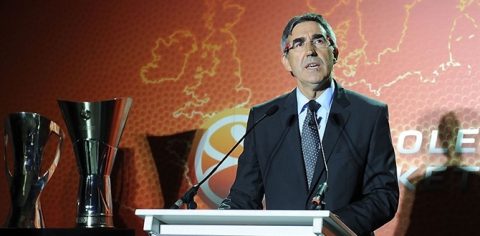Does the Euroleague have a plan B?
Is the Euroleague in trouble now that the COVID-19 pandemic is hitting Europe with a second wave, and the number of infections is souring everywhere?
Governments constantly impose new rules to try to flatten the curve, but with little effect so far. On the contrary, in some countries, the number of infections is higher than ever before. Even higher than at the beginning of the pandemic when there was a complete lock-down.
All of this also affects basketball. Many leagues started much later than normal, and practically all games have to be played without spectators and with mandatory weekly testings. Nevertheless, there has been a tsunami of reported COVID-19 cases among teams, and as a result, games have had to be rescheduled. In the Czech Republic, the league has even been suspended.
Also, todays Euroleague game between ASVEL-Lyon Villeurbanne and Panathinaikos has to be cancelled because multiple players of ASVEL have tested positive in recent days.
Zenit St.Petersburg already lost two games by 0-20 because they had less than eight healthy players available.
Maybe not the best team will win the title this year, but the healthiest?
How long can we go on like this? The situation is especially complicated for international competitions like the Euroleague. The question is, does the Euroleague have a plan B?
Euroleague President and CEO Jordi Bertomeu partially addressed the topic in an interview with El Mundo.

Why didn’t the Euroleague finish the 2019/2020 season?
Bertomeu points to the fact most of the other leagues that did finish the season were national competitions. The Euroleague, on the other hand, has to deal with borders. For example, some countries had a complete lock-down in which all travel was forbidden. Moreover, the situation changed almost every week. Last but not least, don’t forget the referees. The Euroleague has referees from 72 different countries!
What happens if games have to be canceled?
Bertomeu says that there are all kinds of contingency plans for that. Games can be rescheduled, and if a country is in lock-down, then the game can also move to another location in another country. However, there is a limit to what we can do and how many times a game can be rescheduled. In the end, there will be a 0-20 forfait. Also, there have to be valid reasons for the rescheduling of games. Injuries and a crowded schedule are not valid reasons.
Does the Euroleague have a plan B?
According to Bertomeu, the Euroleague does indeed have different scenarios in place for a plan B. The first step would be to finish the remaining games on the schedule and then move on to the next phase. Actually, the Euroleague already had everything in place for a “bubble” this past season. The logistics, planning, arenas, hospitals, hotels, transportation, e.t.c. That experience can come handy if a “Euroleague bubble” becomes an option later on this season.
What about the financial situation?
The Euroleague’s gross revenue has dropped by 30%, but that of the clubs dropped a little less on average. Sponsors and TV contracts are still in place and are currently being renegotiated. There is hope because nobody has backed out so far. Of course, clubs take an additional hit when they can’t generate income from ticket sales. Germany, France, and Italy were expected to open up their arenas for fans, and Lithuania was thinking about a 50 % capacity, but that was a couple of weeks ago. As stated before, the situation seems to change every week.
Are the schedules of the Euroleague and the FIBA on a collision course again?
There were already problems between the Euroleague and FIBA before this season. Now, it could get even worse when games have to be rescheduled all the time. But there seems to be very little room to maneuver here because this schedule conflict goes beyond that of only two parties. Just think about the NBA and the Olympic Games in Tokyo 2021. It’s going to be a real puzzle, and Bertomeu has already stated that the Euroleague will not scale down the number of games. On the contrary, the FIBA should rethink all the competitions they have in place. Maybe there are too many?
